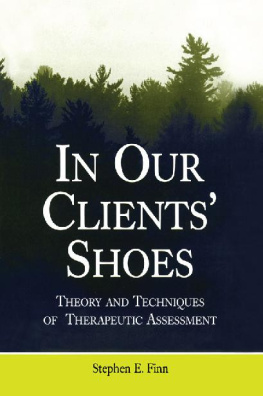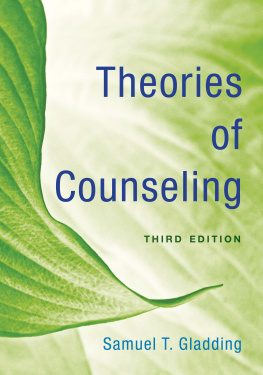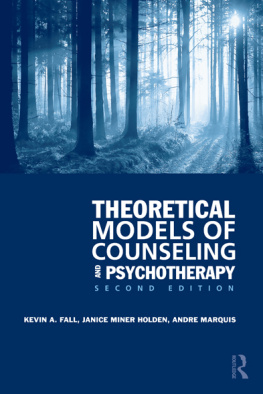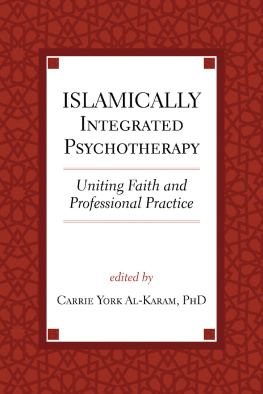Stephen E. Finn - In Our Clients Shoes (Counseling and Psychotherapy)
Here you can read online Stephen E. Finn - In Our Clients Shoes (Counseling and Psychotherapy) full text of the book (entire story) in english for free. Download pdf and epub, get meaning, cover and reviews about this ebook. year: 2020, publisher: Taylor and Francis, genre: Home and family. Description of the work, (preface) as well as reviews are available. Best literature library LitArk.com created for fans of good reading and offers a wide selection of genres:
Romance novel
Science fiction
Adventure
Detective
Science
History
Home and family
Prose
Art
Politics
Computer
Non-fiction
Religion
Business
Children
Humor
Choose a favorite category and find really read worthwhile books. Enjoy immersion in the world of imagination, feel the emotions of the characters or learn something new for yourself, make an fascinating discovery.
- Book:In Our Clients Shoes (Counseling and Psychotherapy)
- Author:
- Publisher:Taylor and Francis
- Genre:
- Year:2020
- Rating:5 / 5
- Favourites:Add to favourites
- Your mark:
- 100
- 1
- 2
- 3
- 4
- 5
In Our Clients Shoes (Counseling and Psychotherapy): summary, description and annotation
We offer to read an annotation, description, summary or preface (depends on what the author of the book "In Our Clients Shoes (Counseling and Psychotherapy)" wrote himself). If you haven't found the necessary information about the book — write in the comments, we will try to find it.
In Our Clients Shoes (Counseling and Psychotherapy) — read online for free the complete book (whole text) full work
Below is the text of the book, divided by pages. System saving the place of the last page read, allows you to conveniently read the book "In Our Clients Shoes (Counseling and Psychotherapy)" online for free, without having to search again every time where you left off. Put a bookmark, and you can go to the page where you finished reading at any time.
Font size:
Interval:
Bookmark:
Theory and Tech nicjues of Therapeutic Assessment
A Lawrence Erlbaum Associates, Inc. Series
Editor, Bruce E. Wampold, University of Wisconsin
This innovative new series is devoted to grasping the vast complexities of the practice of counseling and psychotherapy. As a set of healing practices delivered in a context shaped by health delivery systems and the attitudes and values of consumers, practitioners, and researchers, counseling and psychotherapy must be examined critically By understanding the historical and cultural context of counseling and psychotherapy and by examining the extant research, these critical inquiries seek a deeper, richer understanding of what is a remarkably effective endeavor.
Published
Counseling and Therapy with Clients Who Abuse Alcohol or Other Drugs
Cynthia E. Glidden-Tracy
The Great Psychotherapy Debate
Bruce Wampold
The Psychology of Working: Implications for Career Development, Counseling, and Public Policy
David Blustein
Neuropsychotherapy: How the Neurosciences Inform Effective Psychotherapy
Klaus Grawe
Forthcoming
The Pharmacology and Treatment of Substance Abuse: Evidence and Outcomes Based Perspective
Lee Cohen, Frank Collins, Alice Young, Dennis McChargue
Making Treatment Count: Using Outcomes to Inform and Manage Therapy Michael Lambert, Jeb Brown, Scott Miller, Bruce Wampold
The Handbook of Therapeutic Assessment
Stephen E. Finn
IDM Supervision: An Integrated Developmental Model for Supervising Counselors and Therapists, Third Edition
Cal Stoltenberg and Brian McNeill
The Great Psychotherapy Debate, Revised Edition
Bruce Wampold
Casebook for Multicultural Counseling
Miguel E. Gallardo and Brian W McNeill
Culture and the Therapeutic Process: A Guide for Mental Health Professionals
Mark M. Leach and Jamie Aten
Theory and Techniques of Therapeutic Assessment
Stephen E. Finn

Psychology Press
Psychology Press
Taylor & Francis Group
Taylor & Francis Group
711 Third Avenue
27 Church Road
New York, NY 10017
Hove, East Sussex BN3 2FA
2007 by Taylor & Francis Group, LLC
Psychology Press is an imprint of Taylor & Francis Group, an informa business Originally published by Lawrence Erlbaum Associates
International Standard Book Number-13: 978-0.-8058-5764-1 (Hardbound)
International Standard Book Number-13: 978-0-8058-5764-8 (Softbound)
Cover Design by Kathryn Houghtaling-Lacey
Except as permitted by U.S. Copyright Law, no part of this book may be reprinted, reproduced, transmitted, or utilized in any form by any electronic, mechanical, or other means, now known or hereafter invented, including photocopying, microfilming, and recording, or in any information storage or retrieval system, without written permission from the publishers.
Trademark Notice: Product or corporate names may be trademarks or registered trademarks, and are used only for identification and explanation without intent to infringe.
Library of Congress Cataloging-in-Publication Data
Catalog record is available from the Library of Congress
Visit the Taylor & Francis Web site at
http://www.taylorandfrancis.com
and the Psychology Press Web site at
http://www.psypress.com
Constance T. Fischer
Part I
The History and Development of Therapeutic Assessment
Introduction: What Is Therapeutic Assessment?
Appreciating the Power and Potential of Psychological Assessment
Therapeutic Assessment: Would Harry Approve?
How Therapeutic Assessment Became Humanistic (written with Mary E. Tonsager)
Part II
Specific Techniques of Therapeutic Assessment
Testing Ones Own Clients Mid-Therapy With the Rorschach
Giving Clients Feedback About Defensive Test Protocols
Assessment Feedback Integrating MMPI2 and Rorschach Findings
Assessment Intervention Sessions: Using Softer Tests to Demonstrate Harder Test Findings With Clients
One-Up, One-Down, and In-Between: A Collaborative Model of Assessment Consultation
Therapeutic Assessment of a Man With ADD
Collaborative Sequence Analysis of the Rorschach
Using the Consensus Rorschach as an Assessment Intervention With Couples
But I Was Only Trying to Help!: Failure of a Therapeutic Assessment
Collaborative Child Assessment as a Family Systems Intervention
Teaching Therapeutic Assessment in a Required Graduate Course
Part III
Theoretical Developments
Please Tell Me That Im Not Who I Fear I Am: Control-Mastery Theory and Therapeutic Assessment
Challenges and Lessons of Intersubjectivity Theory for Psychological Assessment
How Psychological Assessment Taught Me Compassion and Firmness
Conclusion: Practicing Therapeutic Assessment
Constance T. Fischer
Part I
The History and Development of Therapeutic Assessment
Introduction: What Is Therapeutic Assessment?
The basic concepts and procedures of Therapeutic Assessment are introduced.
Appreciating the Power and Potential of Psychological Assessment
Psychologists are challenged to acknowledge the life-changing power of psychological assessment. The author tells about his first clinical assessment as a psychology graduate student, through which he became convinced that assessment could affect clients in profound ways.
Therapeutic Assessment: Would Harry Approve?
Links are drawn between the interpersonal theories of Harry Stack Sullivan and the procedures of Therapeutic Assessment. The authors study of Sullivan helped shape Therapeutic Assessment.
How Therapeutic Assessment Became Humanistic (written with Mary E. Tonsager)
The overlap is described between Therapeutic Assessment and Humanistic Psychology. Humanistic procedures were incorporated into Therapeutic Assessment because they proved to benefit clients.
Part II
Specific Techniques of Therapeutic Assessment
Testing Ones Own Clients Mid-Therapy With the Rorschach
Traditionally, assessors have been cautioned against giving the Rorschach to their own psychotherapy clients. The author talks about instances when this practice can be useful and provides four case examples.
Giving Clients Feedback About Defensive Test Protocols
Therapeutic Assessment views guarded or defensive test protocols as signs that clients have conflicting motivations regarding an assessment. Specific guidelines are presented about how to talk to such clients about their test results.
Assessment Feedback Integrating MMPI2 and Rorschach Findings
The MMPI2 and Rorschach tap different levels of clients experience, and this fact is important in understanding patterns of agreement and disagreement between the two tests. Guidelines are presented for giving feedback to clients with different patterns of scores and the author illustrates these guidelines with a detailed case example.
Assessment Intervention Sessions: Using Softer Tests to Demonstrate Harder Test Findings With Clients
Font size:
Interval:
Bookmark:
Similar books «In Our Clients Shoes (Counseling and Psychotherapy)»
Look at similar books to In Our Clients Shoes (Counseling and Psychotherapy). We have selected literature similar in name and meaning in the hope of providing readers with more options to find new, interesting, not yet read works.
Discussion, reviews of the book In Our Clients Shoes (Counseling and Psychotherapy) and just readers' own opinions. Leave your comments, write what you think about the work, its meaning or the main characters. Specify what exactly you liked and what you didn't like, and why you think so.









